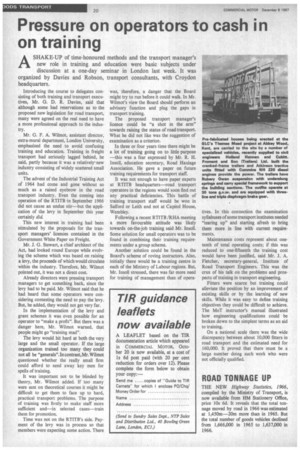Pressure on operators to cash in on training
Page 22

If you've noticed an error in this article please click here to report it so we can fix it.
ASHAKE-UP of time-honoured methods and the transport manager's new role in training and education were basic subjects under discussion at a one-day seminar in London last week. It was organized by Davies and Robson, transport consultants, with Croydon headquarters.
Introducing the course to delegates consisting of both training and transport executives, Mr. G. D. R. Davies, said that although some had reservations as to the proposed new legislation for road transport, many were agreed on the real need to have a more professional approach to the industry.
Mr. G. F. A. Wilmot, assistant director, extra-mural department, London University, emphasized the need to avoid confusing training and education. Training in freight transport had seriously lagged behind, he said, partly because it was a relatively. new industry consisting of widely scattered small units.
The advent of the Industrial Training Act of 1964 had come and gone without so much as a raised eyebrow in the road transport industry. Even the coming into operation of the RTITB in September 1966 did not cause an undue stir—but the application of the levy in September this year certainly did
This new interest in training had been stimulated by the proposals for the transport managers' licences contained in the Government White Paper on Freight.
Mr. J. G. Stewart, a chief architect of the Act, had looked round Europe while evolving the scheme which was based on raising a levy, the proceeds of which would circulate within the industry. Therefore, Mr. Wilmot pointed out, it was not a direct cost.
Already directors were pressing transport managers to get something back, since the levy had to be paid. Mr. Wilmot said that he had heard that some operators were considering contesting the need to pay the levy. But, he added, they would not get very far.
In the implementation of the levy and grant schemes it was even possible for an operator to "make a profit". But there was a danger here, Mr. Wilmot warned, that people might go "training mad".
The levy would hit hard at both the very large and the small operator. If the large organization trained too many they could not all be "generals".Incontrast,Mr. Wilmot questioned whether the really small firm could afford to send away key men for spells of training.
It was important not to be blinded by theory, Mr. Wilmot added. If too many were sent on theoretical courses it might be difficult to get them to face up to hard, practical transport problems. The purpose of training was firstly to make staff more sufficient and—in selected cases—train them for promotion.
Time was not on the RTITB's side. Payment of the levy was in process so that members were expecting some action. There was, therefore, a danger that the Board might try to run before it could walk. In Mr. Wilmot's view the Board should perform an advisory function and plug the gaps in transport training.
The proposed transport manager's licence could be "a shot in the arm" towards raising the status of road transport. What he did not like was the suggestion of examination as a criterion.
In three or four years time there might be a lot of training going on to little purpose —this was a fear expressed by Mr. R. H. Insoll, education secretary, Road Haulage Association. He gave a paper on future training requirernents for transport staff.
It was not enough to have paper experts at RTITB headquarters—road transport operators in the regions would soon find out any practical deficiencies. This battle of training transport staff would be won in Salford or Leith and not at Capitol House, Wembley.
Following a recent RTITB /RHA meeting a more favourable attitude was likely towards on-the-job training said Mr. Insoll. Some solution for small operators was to be found in combining their training requirements under a group scheme.
Another solution could be found in the Board's scheme of roving instructors. Also, initially there would be a training centre in each of the Ministry of Labour regions. But, Mr. Insoll stressed, there was far more need for training of management than of opera
tives. In this connection the examination syllabuses of some transport institutes needed "tearing up" and starting afresh to bring them more in line with current requirements.
Maintenance costs represent about onetenth of total operating costs; if this was reduced to one-fifteenth the training cost would have been justified, said Mr. J. A. Fletcher, secretary-general, Institute of Road Transport Engineers. This was the crux of his talk on the problems and prospects of training in transport engineering.
Fitters were scarce but training could alleviate the position by an improvement of existing skills or by the learning of new skills. While it was easy to define training objectives they could be difficult to achieve. The MoT instructor's manual illustrated how engineering qualifications could be broken down to the simplest terms as an aid to training.
On a national scale there was the wide discrepancy between about 10,000 fitters in road transport and the estimated need for 160,000. It proved that there must be a large number doing such work who were not officially qualified.








































































































